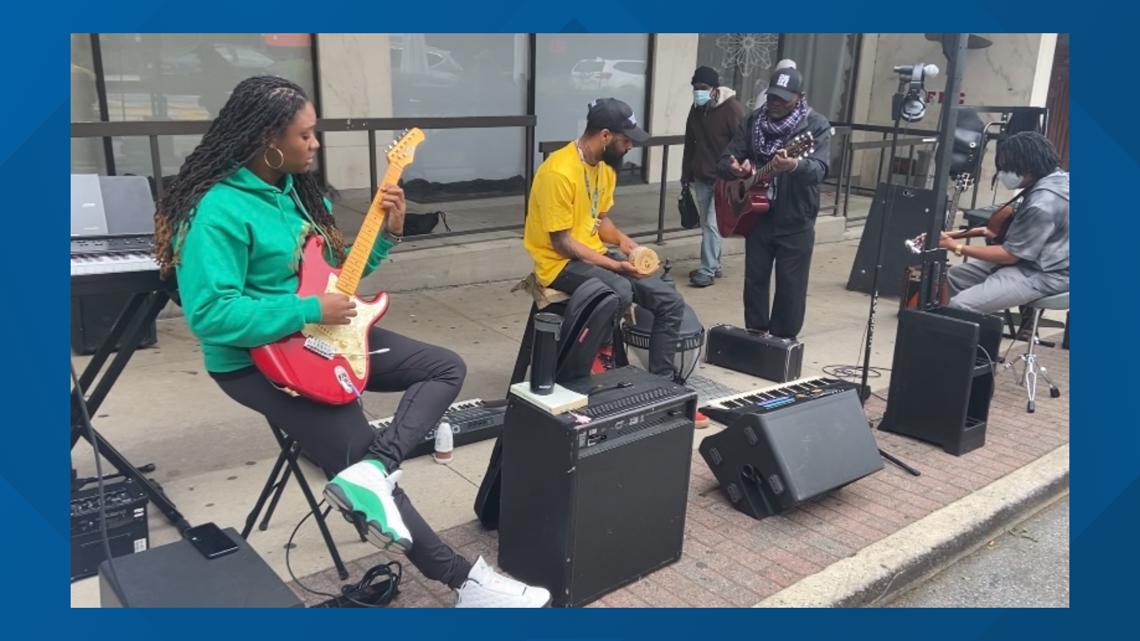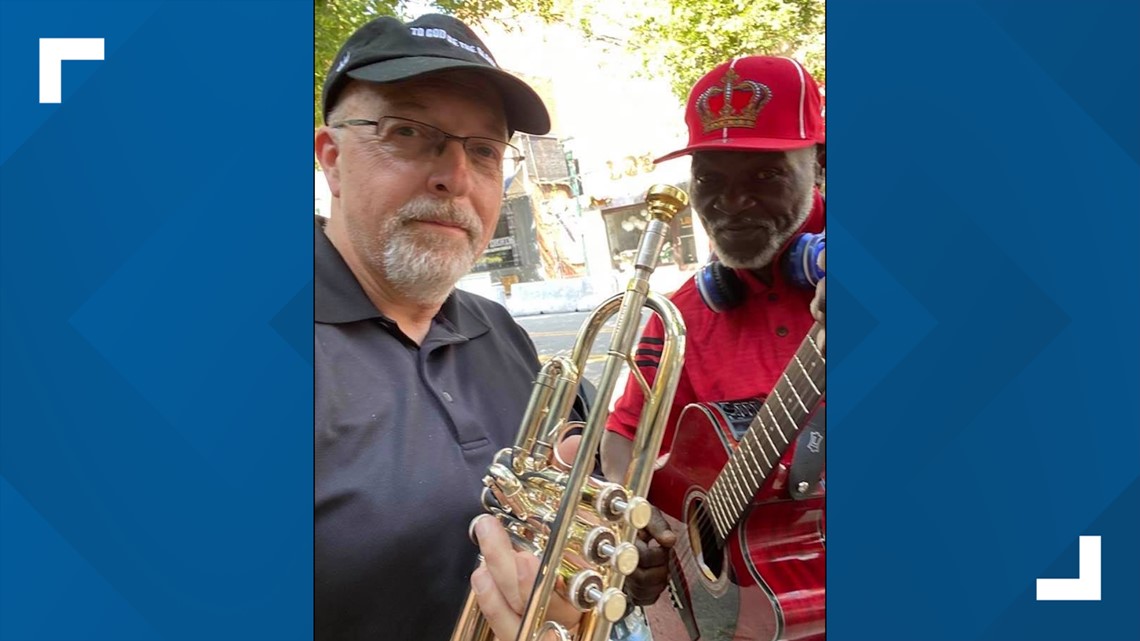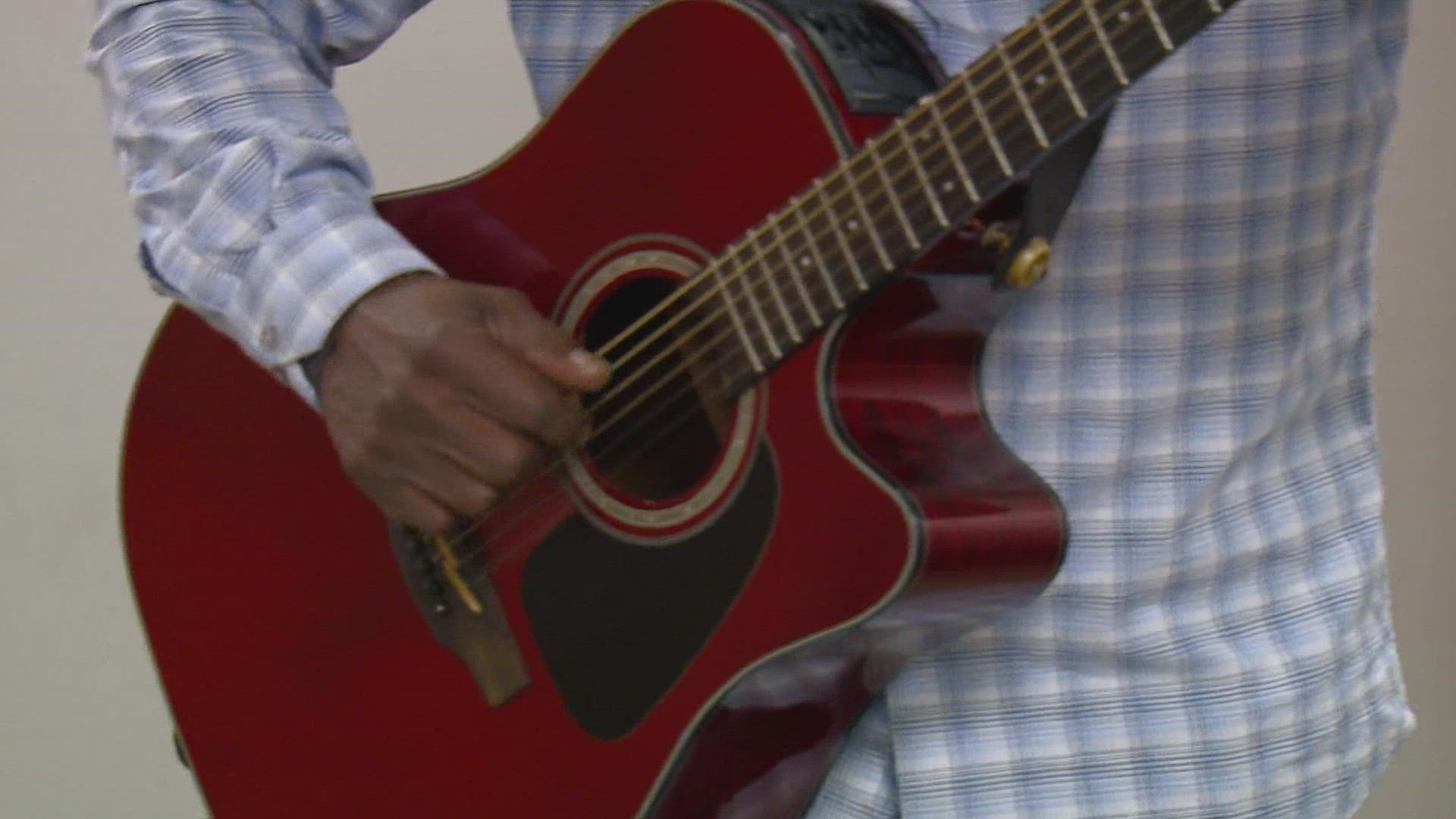GREENSBORO, N.C. — The same number of people are living on the street in 2022 as they were in 2016 in Guilford County.
According to Partners Ending Homelessness, on any given day, at least 83 of the more than 420 people experiencing homelessness in the county can't secure shelter or transitional housing because they all have waitlists.
A musician by the name of George Achini knows the challenges of homelessness. He experiences it himself. But he's also using the vibration of his guitar to pull on the heartstrings of those who could positively impact homelessness.
Making a difference through music
“I came here playing music with different bands,” Achini said. “We traveled all over the world."
He’s since settled in Greensboro and formed his own music institute. The George Achini Institute.
The school has about a dozen members. Meliwe Nxumalo is one of the members who saw Achini's vision.
“What made me want to join is he was prepared to teach people how to play a musical instrument so that those people can teach the homeless people to give them an outlet to their plight,” said Nxumalo, the group's pianist.
Nxumalo said joining the music school has helped her find her purpose.
“I have something in common with George,” Nxumalo said. “To empower the disadvantaged people. That’s my dream. I found that out when I got to know him."


Marquise Wood joined the institute after she heard Achini playing his guitar downtown. She said his music moved her.
“Meeting him - my eyes are open to it. I see it now. And now I can do something about it,” Wood said.
Now, they all intentionally hold practice at the Interactive Resource Center, a day center for the homeless.
"To use our music to touch and inspire people to get back on their feet. To be their best selves,” said Allen Boyd, the institute's bass guitarist. “If this music can be a part of that, all the better.”
The students have held shows at art galleries and churches and changed the tempo of the street corners of Greensboro.
But when the people leave, the music fades and the lights go out, reality hits for Achini. He was diagnosed with bipolar disorder and stopped playing music to focus on his mental health.
"I had no other option."
“I just knew there were times when I was so manic and depressed I wish I was dead,” Achini said.
The daily struggle to survive made it nearly impossible for him to keep a job and he became homeless.
“Getting into the homeless community was strange for me, but I had no other option,” he said.
Achini made every place he laid his head feel like home.
“What I do now at night, I put down the heat lamps and my homies sleep here," Achini said. “I bring my own weather.”
When Achini had no other way to make money, he began playing music on the streets downtown. His unique sound made him known to businesses along Elm Street like pizzeria L’Italiano.
“It's businesses that see beyond your circumstance and see a human,” Achini said. “They not only feed me, they fed my whole community for years. This is my family. He has empathy. We need people like this."
"He could play like nobody's business."
Goodwill and empathy nourished George and pastor Steve Goode's relationship.
“We deliver meals regularly to the IRC; we go there every week,” Goode said. “There was one guy I noticed one day and he could play like nobody’s business. What nurtured our relationship is we kept coming. Now George is one of my dearest friends.”
They’ve become so close Goode has allowed Achini to store his two dozen instruments at his church Northside Baptist.


“I purchased all of my instruments playing guitar on the streets," Achini said. "I go to the pawnshop and put things on layaway."
Pastor Goode has a unique take on homelessness as a former Greensboro police officer.
“Some of the homeless that I deal with now are some of the same ones that were around 20-25 years ago when I was an officer," Goode said.
It's an experience that has stuck with Goode and it's why he’s opened his home to them, allowing George to turn his backyard into a living space.
This has made it easier for the two to come up with a plan to tackle homelessness together through music and the church.
“You can’t fix everybody, but as a solution, imagine you have a four-year program like college," Achini said. "You can evaluate their mental, physical emotional and you add an employment agency, so there’s work. Everything is in-house that’s long-term."
Goode and Achini are looking for individuals with resources that can help them bring this idea to life.
“We need people with the funds,” Achini said. “And I encourage other churches to come together to lead the way in solving homelessness.”
To get involved or support their mission, e-mail pastor Goode at pastor@northsidegreensboro.com
“There’s a lot of help we’re receiving, people mean well, but if you don’t approach this from a holistic standpoint, all you do is put band-aids where you need stitches," Achini said.
"Someone needs shelter every day."
The director of the YWCA, Tiffany Dumas said she agrees.
“We need transitional housing because a lot of folks are not going to get it in 30, 60, or 90 days,” Dumas said. “We can’t address all the layers they’re coming through the doors with.”
The YWCA’s emergency family shelter has enough beds for eight families, but right now, a lack of resources and a roofing issue have forced them to shut down four of their rooms.
“We had 42 families on our waiting list. Now we’re down to 20,” Dumas said. “But it varies every day because someone needs shelter every day.”
Guilford County, with a population of more than 530,000 people, has three other shelters. Partly due to COVID, combined, those shelters have about 50 beds for the entire county, all with waitlists like the YWCA.
Dr. Pamela Palmer is the board chair of the Guilford County Continuum of Care. She said to get those dealing with homelessness to become assets in the community, the entire county needs to work together.
Dr. Palmer spends her days in Zoom meetings, connecting with agencies and local government leaders to get everyone on one accord.
‘We are a task force comprised of directors of our homeless shelters,” Palmer said. “ Other facets of what we do relate to housing and efforts to collect data and info so we can make decisions on what’s needed to serve the homeless population.”
The COC recently secured federal funds from the U.S. Department of Housing and Urban Development to do a homelessness gap assessment.
“That has kicked off and we’ve had listening sessions around addressing homelessness," Dr. Palmer said. "We’ll be working on that through September."
Even once the gaps are identified, Dr. Palmer said some will still fall through the cracks.
“Do I think homelessness will go away, no I don’t,” Dr. Palmer said. “But we can engage and support them in a way where the community continues to grow and thrive.”
Achini believes the best way to know what the homeless need, is to listen to those experiencing it, whether you're a church-goer, a policymaker, or a music man - working to overcome the same obstacles.

